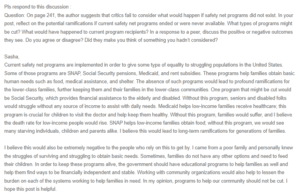Discussion Response – Consequences of Removing Safety Net Programs
Hello,
Thank you for your thoughtful post. You’ve made some critical points about the potential consequences of terminating or reducing present safety net programs. It is clear that programs such as SNAP, Social Security pensions, Medicaid, and rent subsidies play an important role in providing critical assistance to low-income people (Herd et al., 2023). Your observations about the repercussions of eliminating these programs are spot on. The negative outcomes you mentioned are highly worrying, such as increasing the financial burden on seniors and disabled persons without Social Security, higher death rates for low-income people without Medicaid, and the risk of starvation in the absence of SNAP. I agree with you that the lack of these programs could have long-term consequences for generations of families. Your personal experience and understanding of the difficulties that low-income families confront provide an important and sympathetic dimension to your response.
I agree that educational programs and community organizations can be part of a comprehensive approach to combating poverty and financial insecurity. It is critical to empower families to become financially independent and stable (G.m, 2022). While safety net services are important, they should ideally act as a temporary support mechanism, assisting individuals and families in their transition to self-sufficiency. Your invitation to collaborate with neighborhood organizations and provide educational resources is a proactive approach to addressing the core causes of poverty. In this way, we can not only alleviate acute pain but also work toward long-term solutions that will assist individuals in breaking free from the cycle of poverty.
Your writing truly helped me consider the complexities of this problem. While I feel these safety net services are critical, I agree with your focus on the importance of a broader approach to financial independence and stability. It is critical to remember that while safety net programs cannot completely eliminate the difficulties connected with poverty, they are an important component of the solution. Your viewpoint adds to the discussion and emphasizes the significance of a comprehensive approach to assisting struggling families.
References
G.m, S. (2022). Socio-Economic Concept Of “Family Economy.” Confrencea, 1(1), 239–243. https://confrencea.org/index.php/confrenceas/article/view/250
Herd, P., Hoynes, H., Michener, J., & Moynihan, D. (2023). Introduction: Administrative Burden as a Mechanism of Inequality in Policy Implementation. RSF: The Russell Sage Foundation Journal of the Social Sciences, 9(4), 1–30. https://doi.org/10.7758/RSF.2023.9.4.01
ORDER A PLAGIARISM-FREE PAPER HERE
We’ll write everything from scratch
Question

Consequences of Removing Safety Net Programs
Pls respond to this discussion :
Question: On page 241, the author suggests that critics fail to consider what would happen if safety net programs did not exist. In your post, reflect on the potential ramifications if current safety net programs ended or were never available. What types of programs might be cut? What would have happened to current program recipients? In a response to a peer, discuss the positive or negative outcomes they see. Do you agree or disagree? Did they make you think of something you hadn’t considered?
Sasha,
Current safety net programs are implemented in order to give some type of equality to struggling populations in the United States. Some of those programs are SNAP, Social Security pensions, Medicaid, and rent subsidies. These programs help families obtain basic human needs such as food, medical assistance, and shelter. The absence of such programs would lead to profound ramifications for the lower-class families, further keeping them and their families in the lower-class communities. One program that might be cut would be Social Security, which provides financial assistance to the elderly and disabled. Without this program, seniors and disabled folks would struggle without any source of income to assist with daily needs. Medicaid helps low-income families receive healthcare; this program is crucial for children to visit the doctor and help keep them healthy. Without this program, families would suffer, and I believe the death rate for low-income people would rise. SNAP helps low-income families obtain food; without this program, we would see many starving individuals, children and parents alike. I believe this would lead to long-term ramifications for generations of families.
I believe this would also be extremely negative to the people who rely on this to get by. I came from a poor family and personally knew the struggles of surviving and struggling to obtain basic needs. Sometimes, families do not have any other options and need to feed their children. In order to keep these programs alive, the government should have educational programs to help families as well and help them find ways to be financially independent and stable. Working with community organizations would also help to lessen the burden on each of the systems working to help families in need. In my opinion, programs to help our community should not be cut. I hope this post is helpful.

